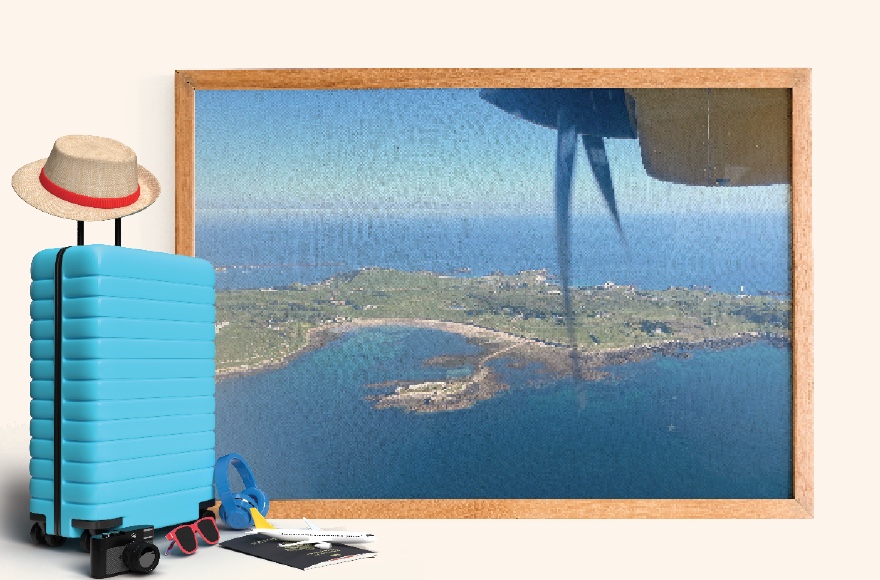Staycation Vacation?
I write these words from the room of my lovely hotel, La Ville, where I find myself “trapped” in a fog-bound Alderney, overlooking the quiet graveyard and church of St. Anne’s, known as The Cathedral of The Channel Islands. The fog and heavy rain are all around. A small island that’s part of the Bailiwick of Guernsey, Alderney has a population of just 2000 persons (“alcoholics clinging to a rock”) and measures just 3 by 1.5 miles. The former residence of such illustrious people as John Arlott (Cricket Commentator), Julie Andrews (Actress), George Martin (Producer to The Beatles) Elizabeth Beresford (Author of The Wombles) and Ian Botham (England cricketer), I have thoroughly enjoyed my two-week sojourn in this charming place. It genuinely feels as if one has stepped back in time over 30 years. After over 5 months locked into our island home of Guernsey, we took up the possibility of an internal “staycation” break by travelling the 35 miles to the neighbouring, sister isle. All still within our Covid-free bubble of Guernsey, which has now been virus-free for over 100 days, at the time of writing. We have not regretted a single moment, not even the fog and travel delays. Particularly in the light of all those British holidaymakers (400,000+) who have suddenly realized they need to dash back home from their French vacations this very weekend to avoid a 14-day self-isolation quarantine upon their return.
This story of sudden mass return from France got me thinking about the role that “the holiday” plays in our modern society, and whether the old habits and priorities are being dramatically transformed, forever. More importantly, in this Covid world which we now inhabit, is there a strong argument to be made for no longer travelling abroad in droves, but instead sticking to our regional communities, visiting local amenities, and travelling internally within our own lands? Staycation or vacation? Is one better than the other? Safer? Morally, environmentally and economically better? In this piece I consider the pros and cons of both options and draw a compelling conclusion as to why I personally favour one to the other.
On the penultimate night of our staycation in Alderney, my wife Jane and I were kindly invited to dinner by a dear friend and former colleague, a retired Classics & Latin schoolmaster called Anthony. He had relocated to Alderney a number of years ago for health reasons. We had not seen him for many years, until last night.
Over a delightfully convivial dinner we enjoyed talking about past adventures and misadventures, old colleagues, family and friends. I even tried out my new joke, wondering whether a blonde police woman could be called a “fair cop”. Raised barely a smirk.
As the evening finished, our host raised a glass and uttered these simple words as a toast:
“To my dearest friends. Thank you for your delightful company and conversation. It has been a real treat and I will cherish tonight for always”.
I replied hastily, paraphrasing Julius Caesar:
“Veni, vidi, cenavi”.
We laughed and parted ways, in the pouring rain.
During our discussions, we had shared thoughts on our travels abroad together. Rome, Madrid, Barcelona, Lisbon. Great adventures that provided a wealth of unforgettable memories and experiences. This is the beauty of holidays and travel abroad. New places, new faces, new experiences, new memories. But it was not always thus…
The word “holiday” has its roots clearly in Christian practice. Originally a Holy Day, these were times in the Christian calendar (such as Easter and Christmas) when days were granted off work in order to rest and worship. They did not entail travelling away from home, simply staying put and dedicating time to non-work activity, religious practice and leisure. Only relatively recently has the concept developed into what we now have taken for granted as the “holiday”, which invariably has become a trip to some foreign location. Until recently seen almost as a mandatory part of modern day life.
The benefits of going away on a holiday are recognized as numerous:
1.
A complete break from the work and home routine.
2.
An escape to the sun, away from inclement and inconsistent weather.
3.
Exploring new horizons, diets and countries.
4. Meeting new and interesting people.
5.
Contributing to the economic development of the respective tourist and travel industries.
6. Educational.
7. Renewing and refreshing.
8.
Re-enforcing the benefits and joys of one’s own home.
The current Covid story has suddenly brought into relief the reasons why those that can afford it go on vacation. The fact that travelling now brings with it potential dangers and risks linked to the pandemic highlights a long list of negative aspects to travelling on vacation. And there are many:
- Travelling means pollution of our skies, waters and lands.
- Mass tourism can mean the destruction of the peace and beauty of the very place people are visiting.
- Foreign travel comes with its inherent dangers and risks – accidents, crime, illness, delays and cancellations. I can never forget, for example, hearing news on Boxing Day 2004 of the horrific Tsunami in SouthEast Asia. Nor the desperately tragic case of Madeleine McCann, taken from her holiday apartment in Portugal in 2007.
- Travel abroad means that the money is taken away from one’s own home-grown tourist industry.
- Cost – many people regularly put themselves into debt, with loans or credit cards, to ensure their holiday is fulfilled.
- Travel stress and trauma – many people return after their trying holidays of marital and family conflicts to admit that they have come back home for a rest! How many divorces are triggered by a summer holiday?
And many people have concluded in this new Covid world that the best thing is indeed to stay in one’s own country (at least this summer) and have a staycation. This in turn has created its own set of problems, as we have all seen in the media, of over-crowded beaches and towns, minimal socialdistancing, traffic chaos, road rage incidents and illegal gatherings.
Weighing up the issues and recent developments, it seems clear to me that the days of mass tourism overseas are over. For people with money, nothing will really change, and this has always been the case, and always will be. They will always travel wherever they wish. But for those people counting their pennies – and these numbers will be increasing by the millions as we move out of the furlough period of government life subsidy – a foreign vacation will no longer be an option. Hence the compelling attraction of a staycation. Not only will this be cheaper and less risky, it will provide much-needed injection of monies into the local communities and businesses. The same could be argued for the tourist industries of Spain, France, Greece etc., whose governments are all desperately trying to convince us that their countries are safe holiday destinations. However, another result of this pandemic will be a “me-first” approach, more so than ever. Look after your family, friends and country first.
However, the biggest benefit for me in this staycation story is actually linked to people, and was brought home to me at dinner with my good friend Anthony. Travelling abroad means meeting new people, often very nice and very interesting. Travelling “at home” on holiday means you have the opportunity to meet your friends, again, as well as your family, who may be scattered to all four corners of the nation. A reacquainting and refreshing of those connections, bonds and friendships. For that reason alone a staycation will always come above a vacation for me in its importance and value. To return to my ex Classics master friend, I summarize with a line from the philosopher and thinker he admired the most, Socrates:
“Be slow to fall into friendship; but when thou art in, be firm and constant”.
Website: www.jlromanillos.com
Email: jose@jlromanillos.com
NB. FOOTNOTE re ALDERNEY RESTAURANTS/HOTELS
Eateries in Alderney are surprisingly numerous and of a very good quality. Great places to meet friends and share good food experiences. For me the following have been tried and tested and I can thoroughly recommend them, including the venue of our delightful dinner with Anthony*. We did not have time, regrettably, to try the other great places of repute, including a Breton French Restaurant, a Curry House and a Steak House. We will try these on our next visit.
In no particular order of preference:
The Braye Beach Hotel – lovely restaurant with stunning view over the beach. The locally produced pork (chop) was amazingly moist and tasty. Their signature seafood Hot Pot for me was also a winner.*
The Blonde Hedgehog – named after the local albino animals, this new hotel and restaurant offers nice fine dining and wines. Lovely gardens, too.
The Georgian House – simply excellent. Loved the mackerel, moules frites and chocolate fondant dishes. The tasty local pork chops again featured. Nice terrace garden in the rear.
Cantina 16 – nice selection of tapas and pizzas. Sea view again.
The Old Barn – lovely garden restaurant alongside stunning Longis bay.
Mai Thai – atmospheric Thai restaurant that also does takeaway. Nice service and very moorish food. Best in the Channel Islands, even?
The Moorings – incredibly popular outdoor pizza specialist.
La Ville – fantastic cooked breakfasts and unctuous Beef Wellingtons. Great position in the centre of town. Lovely service and attention.




